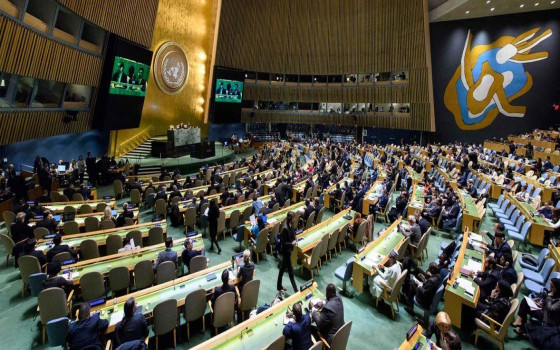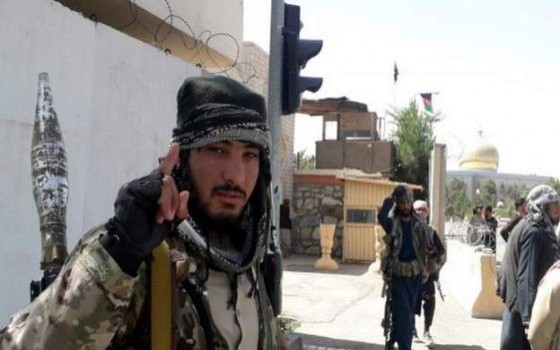
The role of youth in the Mediterranean region in confronting security challenges...discussed by a ministerial meeting at the UN Security Council

- Europe and Arabs
- Thursday , 18 April 2024 11:56 AM GMT
New York: Europe and the Arabs
In a high-level meeting at the ministerial level, the UN Security Council discussed “the role of youth in confronting security challenges in the Mediterranean region.” The United Nations Under-Secretary-General for Political and Peacebuilding Affairs, Rosemary Di Carlo, stressed that the meeting is a reminder that promoting meaningful youth participation must remain “a priority for all of us.” According to what was stated in the daily news bulletin of the United Nations, and we received a copy of it this Thursday morning
The meeting was chaired by Ian Borg, Minister of Foreign, European Affairs and Trade of Malta, whose country holds the rotating presidency of the Security Council for the month of April.
In 2015, the UN Security Council adopted its landmark Resolution 2250 on Youth, Peace and Security, which for the first time recognizes “the important role that young people can play in preventing and resolving conflicts.”
As the tenth anniversary of this pioneering resolution approaches, Rosemary DiCarlo emphasized that “investing in youth is an investment in the future,” noting that the Secretary-General’s new peace agenda strongly calls for the active participation of youth in decision-making processes. She said that the United Nations is intensifying its efforts in this regard.
DiCarlo described the reason for focusing today's discussion on the Mediterranean region as "good," noting that young people constitute 55 percent of the population in the southern and eastern Mediterranean. She recalled the wave of demonstrations that swept the region in 2011, of which young people were at the forefront, "protesting the deprivation of their rights and the lack of economic and job opportunities."
We have also witnessed how violent and extremist networks have exploited such grievances to attract young people to their ranks, DiCarlo said. Young people also make up most of those who cross the perilous Mediterranean, fleeing conflict and poverty and in search of a better life.
DiCarlo highlighted estimates that one in four young people around the world are affected by violence or armed conflict. Young people, especially women, are more vulnerable to neglect, abuse and exploitation. “Young people are more likely to be recruited by armed groups when they have no other opportunities to earn a living,” she said.
Gaza's youth are exposed to unprecedented levels of violence
In addition, it is also estimated that more than 90% of all deaths resulting from direct conflict occur among young males, according to Ms. DiCarlo, noting that these facts and figures are evident in the disaster unfolding in part of the Mediterranean. The attack launched by Hamas on Israel on October 7 and the war in Gaza destroyed the lives of many young people.
She said that seventy percent of Gaza's population is under the age of 30, and almost all of them have been exposed to unprecedented levels of trauma, violence, disease and food insecurity. All schools were closed throughout the Gaza Strip, affecting more than 625,000 students.
Training future leaders in Libya
DiCarlo emphasized that creating a political space for young people to meaningfully participate in peace and security initiatives is essential. For example, last September, the United Nations Mission in Libya launched the “Training Future Leaders in Libya” initiative.
This initiative provides the opportunity for thirty young Libyan women to develop their skills in the field of human rights, in addition to legislation and policies to enhance women’s participation and combat hate speech. In February, the program brought these young women to the European Parliament, where they discussed the impact of the conflict on young people in Libya.
Representing the Middle East and North Africa Alliance on Youth, Peace and Security, the young Tunisian woman Sarah Al-Massoudi spoke, saying that the region’s youth are exhausted and “enough is enough.” She added: "As I speak to you now, more than 40,000 Palestinians, including youth, children, women and men, have either been killed or are under the rubble."
She stressed the need to confront the challenges, wars, conflicts and insecurity that have continued for generations.
But despite these challenges, Sarah Al Masoudi pointed to what she described as “a space for creativity” in the midst of the ongoing challenges in the Mediterranean region, “and thus an opportunity to create resilience and sustainable peace.”
She highlighted five challenges that she said were facing young people in the Mediterranean region:
First, civic spaces are under attack and protection needs are urgent.
Second, young people face systemic barriers to meaningful participation in politics and peace processes. Thus, young people challenge the status quo and reject participation that does not adhere to the principles of the resolution on youth, peace and security.
The third challenge lies in movement in the Mediterranean region, noting that young people face very complex travel requirements, represented by the difficulty of obtaining travel visas, which prevents their participation at the regional and global levels.
To meet this challenge, Al Masoudi says young people are using the power of technology and social media to advance peace: “They are creating collaborative digital communities that challenge borders and fear.”
On the other hand, Sarah Al-Masoudi says that migration policies and agreements continue to harm the rights of migrants, noting that people crossing one of the deadliest migration routes, the Mediterranean, lack protection policy systems.
She went on to say: "We want the Mediterranean to be a sea of hope and opportunity, where young people connect with their peers on other shores. We want the Mediterranean to be a sea of peace, not death."
Fourth, the need to address security risks.
Fifthly, providing funding for prevention and peacebuilding operations.
Ambassador Nasser Kamel, Secretary-General of the Union for the Mediterranean, which is “an intergovernmental institution that includes 28 member states of the European Union and 15 countries from the southern and eastern shores of the Mediterranean to promote dialogue and cooperation,” also spoke at the Security Council session.
Ambassador Kamel said that it is time to highlight the Mediterranean region not only as a region full of global challenges, but also as a laboratory for finding solutions that benefit the whole world.
For this reason, Ambassador Nasser Kamel said that the Union works with and for young people so that they can build a more inclusive and sustainable future, noting that in 2021 the Union launched the Youth Strategy for 2030, which is based on three pillars:
First, environmental and climate action, second, education and employment, and third, social inclusion and participation.












No Comments Found